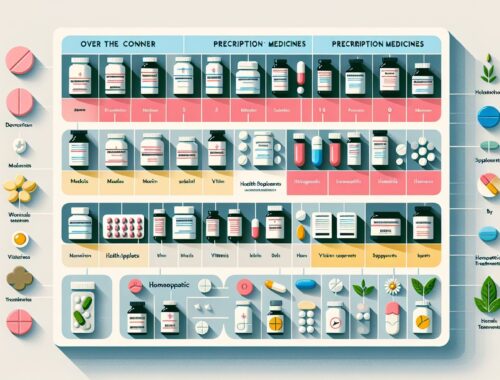
Understanding Different Types of Medicines
Medicines play a crucial role in maintaining our health and well-being. Whether it’s combating an illness or managing a chronic condition, there are various types of medicines available to help us achieve optimal health. In this article, we will delve into the different classes of medicines and their functions, shedding light on how each type benefits our bodies.
Introduction
Medicines can be classified into five main categories based on their intended purpose and mode of action: prescription medicines, over-the-counter (OTC) medicines, vitamins and supplements, natural remedies, and complementary medicines. Each category serves a specific purpose and offers unique benefits.
Prescription Medicines
As the name suggests, prescription medicines are medications that can only be obtained with a prescription from a licensed healthcare professional. These medicines are primarily intended for the treatment of specific medical conditions. Prescription medications are highly regulated, ensuring their safety and efficacy. They often include antibiotics, antidepressants, painkillers, and various other drugs that require professional monitoring and oversight.
Over-the-Counter Medicines
Over-the-counter medicines are readily available without a prescription, making them accessible to the general population. These medications are designed to alleviate common health concerns such as colds, allergies, and minor aches. Examples include pain relievers, antacids, cough syrups, and allergy medication. While OTC medicines are generally safe when used as directed, it’s essential to carefully read labels and adhere to recommended dosages.
Vitamins and Supplements
For those seeking to supplement their diet or address specific nutritional deficiencies, vitamins and supplements are popular choices. These products provide an array of essential nutrients, such as vitamins, minerals, antioxidants, and herbal extracts. While vitamins and supplements are not intended to treat specific diseases, they can support overall health and well-being. It’s crucial to consult with a healthcare professional before adding any new supplements to your routine, as they can interact with other medications or have unintended side effects.
Natural Remedies
Natural remedies encompass a broad range of plant-based or naturally derived substances that have traditionally been used for medicinal purposes. This category includes herbal remedies, homeopathic medicines, and traditional medicines from different cultures worldwide. Examples of natural remedies include chamomile tea for relaxation, ginger for digestive discomfort, and echinacea for immune support. While some natural remedies have scientific backing, others may have limited evidence supporting their effectiveness. It’s essential to approach natural remedies with caution and consult with a healthcare professional to ensure their safe use.
Complementary Medicines
Complementary medicines refer to treatments and therapies used alongside conventional medical practices. These may include acupuncture, chiropractic care, aromatherapy, and massage therapy. Complementary medicines aim to enhance overall well-being and may offer relief and support for certain conditions. However, it’s essential to discuss these therapies with your healthcare provider to ensure they complement your existing treatment plan and do not interfere with prescribed medications.
Conclusion
Medicines encompass a vast and diverse range of products, each with its own purpose and benefits. Whether they are prescription medications, over-the-counter remedies, vitamins, natural substances, or complementary therapies, each type of medicine plays a crucial role in supporting our health and well-being. By understanding the different categories of medicines, we can make informed decisions about our healthcare and work towards achieving optimal health. Remember to always consult with a healthcare professional before starting any new medications or treatments to ensure their appropriate use and minimize potential risks.
You May Also Like

Exploring the Different Types of Medicines
February 22, 2024
Different Types of Medicines: A Comprehensive Guide
January 18, 2024

